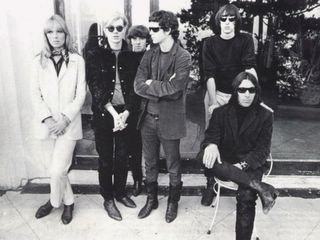
Directed by Albert Magnoli, 1984, USA, 111 minutes, R
The Kid (Prince) and his band The Revolution are one of three house bands at the Minneapolis club First Avenue. When a beautiful girl, Apollonia (Apollonia Kotero), appears on the scene she causes a rift between The Kid, The Revolution and his arch rivals Morris Day and The Time. Meanwhile his family is breaking apart and his father commits suicide. Things aren't looking good for the kid and soon he is fighting for his career, his band and his girl.
In the early Eighties Prince Nelson Rogers produced a succession of albums that enjoyed critical success but somehow never quite hit big;
Prince,
Dirty Mind and
Controversy all featured the rock edged funkiness that he is renowned for but lacked that certain spark to send him to the big league.
1999 pushed him closer but no one could have foreseen the huge hit that
Purple Rain, both the film and album, was to become.
It was a big risk for anyone to back a film starring a relatively unknown name; they even started filming without any financial support or a distributor but the moment
When Doves Cry was released as the first single from the soundtrack album Prince hit the big time. With over 10,000,000 copies of the album sold and earning millions at the box office, its no wonder that Quentin Tarantino recently announced at the 2004 Grammies that
Purple Rain is the greatest rock film ever made.
Combining Hendrix style guitar histrionics and James Brown dance moves, he went on to become one of the most influential artists in the Eighties. Looking back at
Purple Rain now the music still packs a punch; from the epic opening riffs of
Let's Go Crazy to the dance pop of
Baby I'm a Star every track is a winner, each musical set piece perfectly serving the film and propelling the story forward.
The Beautiful Ones and
Darling Nicki in particular work wonders as Prince first woos and then berates Apollonia from the stage of the 1st Avenue Club.
The performances are surprisingly good for a mainly first time cast; Prince excels as the brooding Kid. Much like Madonna in
Desperately Seeking Susan and David Bowie in
The Man Who Fell to Earth it seems famous rock stars are good for one great performance playing a character very similar to themselves. Prince went on to make
Under the Cherry Moon, a film ripe for rediscovery, and the truly terrible
Purple Rain sequel -
Graffiti Bridge.
Morris Day and Jerome from The Time provide the slapstick humour to counter the brooding sad life of the Kid. His family is breaking up, his father on the verge of suicide. The relationship between the kid and his father is the core of the film. His fathers chilling statement "never get married" is actual paternal advice Prince was given as a young man by his own father. This gives
Purple Rain something lacking from most Eighties music, a soul. All the usual vacuous "Me generation" trappings of the decade are present, the questionable fashions, cheesy keyboards, bizarre haircuts and
Purple Rain does indeed use every cliché in the book to tell its story but the minute the band start playing the films awesome title rack there won't be a dry eye in the house.
Presented here for the first time in widescreen, Warners have given the disc a fine selection of extras. Director Magnoli, producer Robert Cavallo and cinematographer Donald. E. Thorin all supply a commentary. Trailers for all of Prince's films are also included but the four featurettes make this disc a must have.
First Avenue: The Road to Pop Royalty pays a visit to the club where Prince started and
Purple Rain: Backstage Pass tells the story of the making of the film. Both feature all new interviews with Magnoli, Wendy and Lisa, Apollonia and other members of the band and the films crew. We also look at the films legacy in
Riffs, Ruffles and a Revolution: The Impact and Influence of Purple Rain.
A live report from the MTV premiere of
Purple Rain from Mann's Chinese Theatre in LA is retro heaven. Featuring catwalk appearances and interviews with Eddie Murphy, Weird Al Jankovic, John Cougar Mellancamp, Lionel Ritchie, Joan Jett and Prince's band The Revolution. It's worth buying the disc purely for the appearance of Pee Wee Herman arriving at the theatre in a toy car.
To round things off you get the music videos for
Let's Go Crazy, Purple Rain, When Doves Cry and five others by Prince, Apollonia and The Time.







